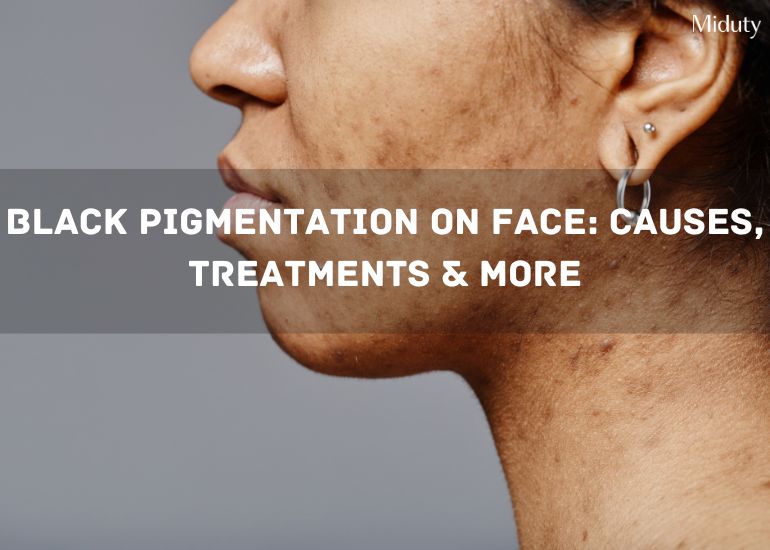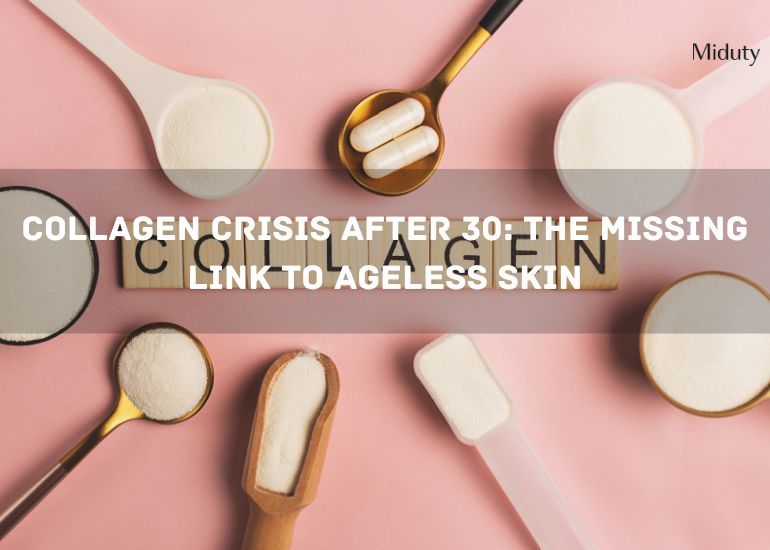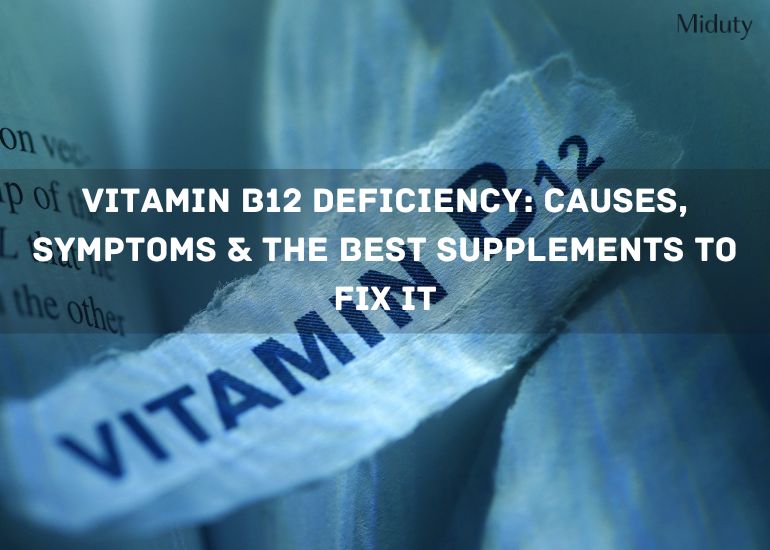
Black Pigmentation on Face: Causes, Treatments & More
Black Pigmentation on Face: Causes, Treatments & More
Key Takeaways
1) Pigmentation is more than skin deep: Did you know black pigmentation on the face isn't just cosmetic? It can be triggered by sun damage, hormonal changes, nutritional imbalances, and even your family genes!
2) Sunlight is one of the major culprits: UV rays stimulate melanin to protect your skin, but over time, this defense mechanism can lead to stubborn pigmentation.
3) Omega-3 imbalance is common: Most diets have a skewed Omega-6 to Omega-3 ratio, which can silently affect your skin health and pigmentation.
4) The role of hormones: Hormonal fluctuations during pregnancy or while on contraceptives can lead to melasma, a common type of hyperpigmentation.
5) Skincare isn't just topical: Supplements like NAC, glutathione, and Omega-3s can work wonders in tackling pigmentation from the inside out.

Do you feel less confident in your skin because of the pesky black pigmentation on your face?
Or do you always look for creams or makeup to hide dark spots?
Dark spots and patches on the face can be frustrating, especially when they appear out of nowhere. Many of us have been there, staring at those dark spots and thinking, "Is it stress?" Or "Am I doing something wrong with my skincare routine?" These questions are quite common and the truth is that pigmentation can be triggered by a mix of factors, from sun exposure to hormonal fluctuations and even genetics can be a reason.
But here's the thing: while dark pigmentation on the face seems stubborn; it's not invincible. With the right knowledge, care, and a little patience, your skin can again make you gain your confidence back. In this blog, we will highlight why pigmentation comes on the face, its causes and solutions to help you tackle it head-on.
Table of Contents
1. What is Black Pigmentation on the Face?
2. Why Pigmentation Comes on the Face?
3. Topical Treatments for Black Pigmentation on Face
4. Supplements for Reducing Black Pigmentation on Face
5. Conclusion
6. FAQs on Black Pigmentation on Face
7. References
What is Black Pigmentation on the Face?
Black pigmentation on the face refers to darkened patches or spots caused by excess melanin production in the skin. Melanin, the pigment responsible for skin color, can become concentrated in certain areas due to various factors, leading to uneven skin tone.
This condition is medically known as hyperpigmentation. It can affect people of all skin types but tends to be more visible in individuals with darker skin tones. There are three types of hyperpigmentation, including:
- Age Spots or Liver Spots
- Melasma
- Post-Inflammatory Pigmentation [1]
So, dark pigmentation on the face is not just a cosmetic issue, it can also be caused due to underlying skin or health concerns. Certain medications may also show side effects, such as hyperpigmentation on the face.
Also Read: Pigmentation on Forehead: Causes, Types, Treatments, & Prevention Tips
Why Pigmentation Comes on the Face?
Understanding why pigmentation comes on the face is crucial if you want to jump over to the right treatment for it. Here are some most common causes of black pigmentation on the face:
1. Sun Damage
Excessive exposure to the sun is the leading cause of pigmentation. UV rays stimulate melanin production from the melanocytes (the cells that produce melanin) to protect the skin. Although melanin provides natural protection to your skin, as a result, it also may give you sunspots or dark patches over time.

Reminder: Wear sunscreen regularly and ensure your sunscreen has an SPF of more than 30 with broad spectrum protection from UVA and UVB radiations. Keep reapplying sunscreen every 2-3 hours and avoid sun exposure during peak radiation time of 10 AM to 4 PM.
Pro Tip: Don't skip sunscreen even on cloudy days.
2. Hormonal Imbalances
Changes in hormones, especially during pregnancy or taking oral contraceptives or hormone therapy, can trigger melasma – a form of pigmentation that appears as brown or gray patches on the face.
Fluctuating levels of estrogen and progesterone may cause black pigmentation on the face as they stimulate the production of melanocytes.
Also Read: 5 Powerful Ways on How to Control Hormonal Imbalance
3. Skin Inflammation

After healing from acne, eczema, or injuries, one may develop post-inflammatory hyperpigmentation (PIH). This is a common cause of dark pigmentation on the face in individuals with acne-prone skin. It may appear anywhere on the body as dark patches or spots.
4. Aging
With age, the skin's natural ability to regenerate diminishes, leading to the formation of liver spots or age spots, especially on sun-exposed areas like the face, neck, arms, etc. These spots appear as brown, tan, or black pigmentation on the face. Aging or excessive sun exposure are the main reasons for such hyperpigmentation.
5. Medications and Chemicals
Certain medications, like antibiotics or chemotherapy drugs, may cause pigmentation as a side effect. Harsh skincare products can also irritate the skin and trigger hyperpigmentation on the face.
Medications like antihypertensives, antimalarials, and anticonvulsants, may also cause hyperpigmentation on different body parts. [2][3]
6. Genetic Factors
Genetics can significantly influence the likelihood of developing hyperpigmentation and black skin concerns. If hyperpigmentation runs in your family, you may be more susceptible to dark spots or patches due to inherited traits that lead to increased melanin production.
Understanding your family history can help you adopt proactive skincare habits, such as regular sunscreen use and tailored treatments, to manage pigmentation effectively.
Topical Treatments for Black Pigmentation on the Face
Over-the-counter and prescription creams can help lighten dark spots. You can look for the following ingredients in your skincare to treat the condition:
1) Hydroquinone
It is great for skin issues like dark patches, age spots, or melasma. Hydroquinone helps by reducing melanin production and is highly effective in treating pigmentation. [4]
2) Retinoids
Retinoids are one of the vitamin A derivatives, which help promote skin cell turnover, thus, helping reduce pigmentation when used regularly. Make sure you increase the retinol concentration gradually. Start with lower concentration and don't forget to take a patch test before adding it to your routine. [5]
3) Vitamin C
It brightens skin and neutralizes free radicals that cause pigmentation. Make sure you don't use Vitamin C-based products in the daytime as they may oxidize in the sun. [6]
4) Niacinamide
It is a form of Vitamin B3, which works well for reducing pigmentation and improving skin texture. [7]
Supplements for Reducing Pigmentation
Achieving clear and even-toned skin is much more than what you apply on the surface, it also requires nourishing your skin from within. Certain nutrients and supplements can play a significant role in reducing pigmentation and enhancing overall skin health. Here are some key nutrients that you should consider if you want clear skin:
1. Omega-3 Fatty Acids
Omega-3s, commonly found in sources such as fish oil, chia seeds, and walnuts, help strengthen the skin's natural barrier, reduce inflammation, and improve skin hydration. All this helps in reducing hyperpigmentation on the face.
Even if your diet includes Omega-3-rich foods, you may still experience an Omega-3 deficiency, while Omega-6 levels in your body could remain disproportionately high. This imbalance occurs because the ideal Omega-6 to Omega-3 ratio is 1:1, but typical dietary habits often push this ratio as high as 4:1. Such a skewed ratio can contribute to significant health concerns.
Supplements provide your body with Omega-3 and Omega-6 fatty acids in a well-balanced ratio, making them a highly preferable choice over food items with Omega-3 fatty acids.
Also Read: Omega 3 Fatty Acids Benefits: For That Extraordinary Brain
2. Astaxanthin
This potent antioxidant, astaxanthin, is primarily derived from microalgae and offers great protection against oxidative stress in the body and harmful UV rays. By neutralizing free radicals, astaxanthin can help prevent pigmentation and fade dark spots, making it a valuable addition to your skincare routine. Additionally, astaxanthin acts as a powerful internal sunscreen which prevents further pigmentation caused due to UV damage.
3. N-Acetyl Cysteine (NAC)
NAC boosts the production of glutathione in our body, which is a powerful antioxidant in the body. By reducing oxidative stress and promoting detoxification, NAC can help lighten dark pigmentation on the face and support an even-tone skin tone over time.
4. Glutathione
Glutathione is one of the most powerful antioxidants in our body, which helps in neutralizing free radicals and reducing oxidative stress, and thus, it promotes anti-aging as well. So Incorporating a Glutathione supplement in the routine can make your pigmentation fade away with time. Look for Glutathione supplements in their liposomal form to maximize their effects.
Incorporating these nutrients through a balanced diet or supplements can complement topical treatments, enhancing your efforts to achieve smooth, even-toned skin.
Conclusion
Dealing with black pigmentation on the face can feel frustrating, but understanding its causes and solutions empowers you to take control of your skin health. Whether it's due to sun damage, hormonal changes, or genetics, knowing why dark pigmentation on the face appears is the first step toward treating it effectively.
By incorporating sun protection, using topical treatments like retinoids and Vitamin C, and addressing underlying health factors, you can reduce pigmentation and regain a more even skin tone.
Remember, consistency and patience are key when tackling pigmentation. If over-the-counter remedies don't yield results, consult a dermatologist to explore advanced treatments tailored to your needs. With the right care and proactive habits, achieving clearer, healthier-looking skin is possible.

Frequently Asked Questions on Black Pigmentation on Face
Q1 - How do you treat hyperpigmentation in black skin?
Topical therapy is the recommended first line of treatment for black pigmentation on the face. While starting with the topical treatment, make sure to get a patch test first or consult a dermatologist to get started with it.
Q2 - Can hyperpigmentation go away?
Depending upon the cause behind your hyperpigmentation; it can be cured. If you have hormonal issues that are causing you hyperpigmentation and black skin, then you need to work on fixing your hormones first and eventually, it will go away.
Q3 - How can you prevent pigmentation?
Apply sunscreen every day, even on cloudy days, and make sure your sunscreen has an SPF of more than 30 with broad spectrum protection. Take antioxidant supplements like Resveratrol or Glutathione to maintain a healthy glow on your face.
Q4 - Why does pigmentation come on the face?
Sun exposure, hormonal fluctuations, Vitamin B12 deficiency, or skin inflammation are some of the reasons behind black pigmentation on the face.
Q5 - Is Vitamin C good for pigmentation?
Yes, Vitamin C can fade hyperpigmentation on the skin with the help of its ability to reduce the production of melanin in the skin cells. Thus, using Vitamin C is a good choice, but make sure you don't use Vitamin C-based products in the morning or before going out into the sun.

References








